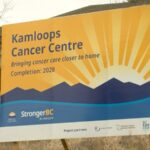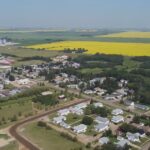After decades of advocacy and planning, Toronto’s Indigenous community celebrated a watershed moment this week with the grand opening of the Anishnawbe Health Toronto’s new Indigenous Health Centre. The state-of-the-art facility represents far more than just a building—it embodies a vision of culturally appropriate healthcare designed by and for Indigenous peoples that has been over 40 years in the making.
The gleaming four-story, 45,000-square-foot structure stands as the centerpiece of the Indigenous Hub in Toronto’s West Don Lands. Unlike conventional medical facilities, this centre was conceived to honor traditional healing practices alongside modern medicine, creating what Indigenous leaders describe as a “decolonized space” for healthcare delivery.
“This is not just a health centre. This is a place of healing, of reconnection, and of cultural revitalization,” explained Joe Hester, Executive Director of Anishnawbe Health Toronto, during the emotional ribbon-cutting ceremony. “For generations, our people have had to navigate healthcare systems that weren’t designed with our traditions or needs in mind. Today marks a turning point.”
The facility integrates architectural elements that reflect Indigenous values and worldviews. Circular meeting rooms honor the sacred circle concept, medicine gardens provide traditional healing plants, and ceremonial spaces allow for smudging and other cultural practices. Natural light floods the interior through carefully positioned windows, while wood elements connect visitors to the natural world.
According to Canada News, the $43 million project received support from all levels of government, alongside significant private donations and community fundraising efforts. Indigenous Services Canada provided $10 million in federal funding, recognizing the centre as a potential model for Indigenous healthcare delivery nationwide.
What sets this facility apart is its holistic approach to wellbeing. Beyond conventional medical services, the centre houses dental care, traditional healing, mental health supports, family services, and community gathering spaces. This comprehensive model acknowledges the interconnectedness of physical, mental, emotional, and spiritual health central to Indigenous wellness frameworks.
The opening comes at a critical juncture when CO24 News reports show Indigenous communities continue facing significant health disparities. Statistics Canada data indicates Indigenous peoples experience higher rates of chronic conditions, mental health challenges, and shorter life expectancies compared to non-Indigenous Canadians—disparities rooted in historical trauma, systemic barriers, and culturally inappropriate care models.
Toronto Mayor Olivia Chow, who attended the ceremony, emphasized the significance of the achievement. “This centre represents what reconciliation looks like in action—supporting Indigenous-led solutions and creating spaces where traditional knowledge is respected and celebrated,” she said. “The city is proud to have played a role in making this vision a reality.”
The broader Indigenous Hub development will eventually include housing, childcare, educational facilities, and commercial spaces, creating a comprehensive community ecosystem. Indigenous architect Douglas Cardinal, whose vision shaped the health centre’s design, noted that the project represents “healing by design” where physical spaces actively contribute to wellbeing.
As the first patients begin receiving care in the new facility, healthcare providers express optimism about its potential impact. Dr. Lisa Richardson, a Mohawk physician and Indigenous health advocate, believes the centre sets a new standard: “When people walk through these doors, they don’t have to leave their identity behind. Their medicines, their ceremonies, their ways of knowing are not just accommodated—they’re central to the healing journey.”
As Canada continues grappling with its commitment to reconciliation, the Anishnawbe Health Toronto centre stands as a tangible example of meaningful progress. The question remains: will this landmark achievement inspire similar Indigenous-led healthcare transformations across the country, or will it remain an exception rather than becoming the new standard for culturally responsive care?

























